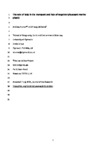The role of kelp in the transport and fate of negatively buoyant marine plastic

Date
2021-09Author
Subject
Metadata
Show full item recordAbstract
We report observations of negatively buoyant plastics washed up on the shores of a beach in southwest England in association with deposits of kelp. Items retrieved included polyethylene terephthalate (PET) bottle fragments, polyvinyl chloride toys, electrical casings, construction plastics, polycarbonate goggles, carcass tags, pot rubber, fishing float fragments and PET textiles, with an upper estimate of 24 t of plastic deposited during a single kelp beaching event. It appears that after kelp becomes detached from the bed during strong winds or tides or through senescence, biological debris becomes associated with or acts to transport benthic plastic landwards through entrainment, entanglement and rafting and, sometimes, attachment to the holdfast. Observations provide evidence of significant local and regional ecological transportation of plastics in temperate coastal environments that is not driven directly or solely by buoyancy, and afford a convenient, non-invasive insight into the makeup of plastic that is encountered in the benthic environment.
Publisher
Journal
Volume
Pagination
Number
Recommended, similar items
The following license files are associated with this item:

